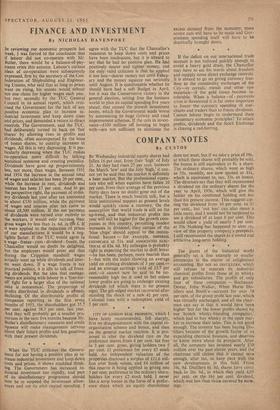COMPANY NOTES
By CUSTOS
BY Wednesday industrial equity shares had fallen 16 per cent. from their 'high' of July 21. As they had risen 27 per cent. between the March low' and the July 'high' it can- not yet be said that the market is definitely a bear market. But the professional opera- tors who sell when equities have fallen 10 per cent. from their average of the previous thirty days have no doubt gone out of the market. There is much 'bearish talk, but a little institutional support at present levels would quickly cause a recovery. On the assumption that world trade is still on the up-trend, and that industrial profits this year will still be higher for the growth com- panies in this country, permitting modest increases in dividend, then certain of the 'blue chips' should appeal to the institu- tional buyers for example, IMPERIAL CHEMICALS at 51s. and ASSOCIATED ELEC- TRICAL at 83s. 6d. My colleague is probably right in expecting the market to drift lower —he has been, perhaps, more bearish than I—but with the index showing an average yield on existing dividends of 5 per cent.— and an average earnings yield of 13.7 per cent.—it cannot now be said to be un- reasonably high (as it used to be) unless lower profits are going to endanger existing dividends (of which there is no present sign). The gilt-edged market recovered after standing the shock of a new 41 per cent. Colonial loan with a redemption yield of 5 per cent.
CITY OF LONDON REAL PROPERTY, WhiCh
have lately recommended, fell sharply, first on disappointment with the capital re- organisation scheme and bonus, and then on the general market reaction. It is pro- posed to alter the dividend rate on the preference shares from 4 per cent. tax free to 5 per cent. gross, giving holders two 5 per cent. £1 preference for every £5 stock held. An independent valuation of the properties disclosed a surplus of £11.6 mil- lion over book values, and £4 million of this reserve is being applied in giving one 5 per cent. preference to the ordinary share- holders for every £2 stock held. I never like a scrip bonus in the form of a prefer- ence share which an equity shareholder does not want, but if we take a price of 16s., at which these shares will probably be sold, the bonus is still equivalent to 8s. a share. The ordinary shares, which went as high as 53s. recently, are now quoted at 41s., which is equivalent to, say, 33s. ex bonus. The directors say that they will recommend a dividend on the ordinary shares for the year to April, 1956, which will give the holder on his combined holding not
than \ his present income. This suggests cut- ting the dividend from 10 per cent. to 71. per cent., but 'not less can also mean a little more, and I would not be surprised to see a dividend of at least 8• per cent. This would allow a yield of nearly 5 per cent. at 33s. Nothing has happened to alter my view of this property company's prospects. I still recommend the shares as a sound and attractive long-term holding.
•
The giants of the industrial world generally set a fine example to smaller companies in the matter of enlightened accounting. But not so DISTILLERS, which still refuses to separate its industrial chemical profits from those of its whisky and gin subsidiaries. The profits of only four of these companies — Buchanan- Dewar, John Walker, White Horse Dis- tillers and Bodth's—account for over 5(1 per cent. of the group profit last year, which was virtually unchanged, and all the chair- man can say is that it would have been higher 'but for the lower profits shown by our Scotch whisky-blending companies,' which had to buy whisky in the open mar- ket to increase their sales. This is not good enough. The investor has been buying pis- -tillers because of the growth factor of its expanding chemical business, and deserves to know more about its prospects. After all, the company has invested nearly £30 million over the past eleven years, and the chairman still claims that it cannot save enough, after tax, to keep pace with the new developments in this field. From 34s. 9d. Distillers 6s. 8dv shares have come back to 26s. 6d., at which they yield 4.05 per cent, on the 161 per cent. dividend, which was less than twice covered by earn- ings.


































 Previous page
Previous page